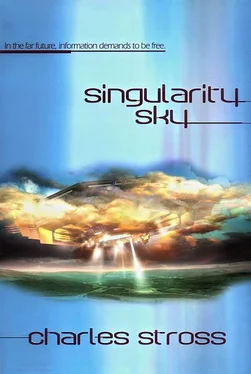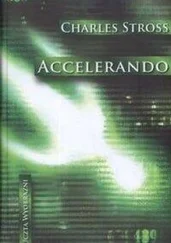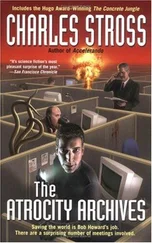Charles Stross - Singularity Sky
Здесь есть возможность читать онлайн «Charles Stross - Singularity Sky» весь текст электронной книги совершенно бесплатно (целиком полную версию без сокращений). В некоторых случаях можно слушать аудио, скачать через торрент в формате fb2 и присутствует краткое содержание. ISBN: , Жанр: Фантастика и фэнтези, на английском языке. Описание произведения, (предисловие) а так же отзывы посетителей доступны на портале библиотеки ЛибКат.
- Название:Singularity Sky
- Автор:
- Жанр:
- Год:неизвестен
- ISBN:9788495024121
- Рейтинг книги:5 / 5. Голосов: 1
-
Избранное:Добавить в избранное
- Отзывы:
-
Ваша оценка:
- 100
- 1
- 2
- 3
- 4
- 5
Singularity Sky: краткое содержание, описание и аннотация
Предлагаем к чтению аннотацию, описание, краткое содержание или предисловие (зависит от того, что написал сам автор книги «Singularity Sky»). Если вы не нашли необходимую информацию о книге — напишите в комментариях, мы постараемся отыскать её.
Singularity Sky
Singularity Sky — читать онлайн бесплатно полную книгу (весь текст) целиком
Ниже представлен текст книги, разбитый по страницам. Система сохранения места последней прочитанной страницы, позволяет с удобством читать онлайн бесплатно книгу «Singularity Sky», без необходимости каждый раз заново искать на чём Вы остановились. Поставьте закладку, и сможете в любой момент перейти на страницу, на которой закончили чтение.
Интервал:
Закладка:
Robard hefted his chair, and pushed forward, into the cramped confines of the boat. “Is he going to be alright?” Lieutenant Kossov asked fussily.
“Who knows? Just show me somewhere to lash his chair and we’ll be off. More chance of getting help for him down—”
Sirens honked mournfully in the passage outside, and Robard winced as his ears popped. Kossov reached past another officer wearing the braid of a lieutenant commander and yanked the emergency override handle: the outer door of the lifeboat hissed shut. “What’s going on?” someone called from up by the cockpit.
“Pressure breach in this section! Doors tight!”
“Aye, doors tight. Is the Admiral aboard?”
“Yes to that. You going?”
In answer, the deck heaved. Robard grabbed a stanchion and held on one-handed, bracing the Admiral’s wheelchair with another hand as the lifeboat lurched. A rippling bang of explosive bolts severed its umbilical connection to the stricken warship, then it was falling — falling through a deliberately opened gap in the ship’s curved-space field, which was otherwise strong enough to rip the small craft apart. Officers and a handful of selected enlisted men struggled to seize anchor points as whoever was in the hot seat played a fugue on the attitude thrusters, rolling the lifeboat out from behind the warship. Then the drive cut in with a gentle buzzing hiss from underfoot, and a modicum of weight returned them to the correct plane.
Robard bent to work on the wheelchair with a length of cable. “Someone help me with the Admiral,” he asked.
“What do you need?” Lieutenant Kossov peered at him, owlish behind his pince-nez.
“Need to tie this chair down. Then — where are we landing? Is there a doctor aboard this boat? My master really needs to be taken to a hospital, as soon as possible. He’s very ill.”
“Indeed.” The Lieutenant glanced at him sympathetically, then his gaze wandered to the somnolent Admiral. “Give me that.”
Robard passed him the other end of the cable, and together they secured the wheelchair to four of the eye bolts that dotted the floor. Around them, the other surviving officers were taking stock of the situation, neatly unfolding emergency deceleration hammocks from overhead lockers and chatting quietly.
The atmosphere aboard the lifeboat was subdued, chastened; they were lucky to be alive, ashamed not to be aboard the stricken battlecruiser. The fact that most of the survivors were officers from the admiral’s staff didn’t go amiss; the real warriors remained at their posts, trying valiantly to halt the plague that was eating the ship around them. In one corner, a junior lieutenant was sobbing inconsolably at the center of an embarrassed circle of silence.
The Admiral, oblivious to everything around him, mumbled and coughed querulously. Kossov leaned forward attentively. “Is there anything I can do for you, my Admiral?” he asked.
“I fear he’s beyond our help,” Robard said sadly. He rested a gentle hand on Kurtz’s shoulder, steadying the Admiral in his chair. “Unless the surgeons can do something—”
“He’s trying to talk,” Kossov snapped. “Let me listen.” He leaned close to the old warrior’s face. “Can you hear me, sir?”
“A-a—” The Admiral gargled in the back of his throat.
“Don’t excite him, I implore you! He needs rest!”
Kossov fixed the servant with a baleful eye. “Be silent for a minute.”
“—Aah, arr — we—’oing?”
Robard started. “Humbly report we are on our way down to the planetary surface, sir,” said the Lieutenant. “We should be arriving in the capital shortly.” Nothing about the rest of the fleet, the disposition of which was anything but likely to arrive in the colonial capital.
“’Ood.” The Admiral’s face relaxed, eyelids drooping.
“’Amprey. I’ve’m wha’ for.” He subsided, evidently exhausted by the effort of speaking.
Robard straightened up: his eyes met those of the Lieutenant. “He never gives up,” he said calmly. “Even when he ought to. It’ll be the death of him one of these days …” Riding a chicken-legged hut through a wasteland that had recently gone from bucolic feudalism to transcendent posthumanism without an intervening stage, Burya Rubenstein drifted through a dream of crumbling empires.
The revolutionaries were ideologically committed to a transcendence that they hadn’t fully understood — until it arrived whole and pure and incomprehensible, like an iceberg of strange information breaking the surface of a frozen sea of entropy. They hadn’t been ready for it; nobody had warned them.
They had hazy folk memories of Internets and cornucopiae to guide them, cargo-cult assertions of the value of technology — but they hadn’t felt the elephant, had no sense of the shape the new phenomena took, and their desires caused new mutant strains to congeal out of the phase space of the Festival machinery.
Imagine not growing up with telephones — or faxes, video conferencing, on-line translation, gesture recognition, light switches. Tradition said that you could send messages around the world in an eyeblink, and the means to do so was called e-mail. Tradition didn’t say that e-mail was a mouth morphing out of the nearest object and speaking with a friend’s lips, but that was a more natural interpretation than strange textual commands and a network of post-office routers. The Festival, not being experienced in dealing with Earth-proximate human cultures, had to guess at the nature of the miracles being requested.
Often, it got them wrong.
Burya knew all about communications; his grandfather had dandled him on his knee and passed on legends his own grandfather had told him, legends about management information systems that could tell the management everything they could possibly know about the world and more, legends about the strange genii of human resources that could bring forth any necessary ability at will. Some of the more wired dissidents of Novy Petrograd had cobbled together something which they, in turn, called a management information system: cameras squatted with hooded cyclopean eyes atop the garrets and rooflines of the city, feeding images into the digital nervous system of the revolution.
Before he’d left Plotsk, Burya had spent some time with Timoshevski. Oleg had applied the leeches to Burya’s engorged sense of importance, reminding him that he was only a high official within the Novy Petrograd soviet, that the soviet, in turn, was only a benign parasite upon the free market, a load-balancing algorithm that would be abandoned when the true beauty of the level playing field could be established. Oleg had also applied the worms, which itched furiously (and occasionally burned) as they established contact with Burya’s nervous system. He’d had to inquire pointedly as to the origins of Burya’s strange sense of bourgeois incrementalism in order to goad his erstwhile colleague into accepting the upgrade, but in the end, Rubenstein had seen no alternative. Given his currently peripatetic occupation, he’d be sidelined by the Central Committee if he stayed out of touch much longer. And so it was that his head itched abominably, and he was plagued by strange visions as the worms of the Committee for State Communications forged a working relationship with his brain.
When Burya slept, he dreamed in rasterized false-color images, scanned from the rooftops of the capital.
The revolution, eternally vigilant, multitasked on his lateral geniculate body, rousting slumbering synapses to recognize suspicious patterns of behavior. Burya found it both disturbing and oddly reassuring to see that the city, for all the changes wrought by the revolution, continued. Here a youth darted from shadow to shadow, evidently on a midnight assignation with his sweetheart; there a grimmer kind of conspiracy fomented, dogs fighting over the bones of temporal responsibility as a block warden stalked a resented houseowner with murder in his eye. Houses grew and fissioned in slow motion, great sessile beasts prodded hither and yon by their internal symbionts. It was all unspeakably alien to him: an eerie half-life crawling over the once-familiar city, echoes of the way he’d lived for years, lying like a corpse in an open casket. Even the searing light of a nighttime shuttle landing at the field outside the city couldn’t bring it back to a semblance of the life he’d known.
Читать дальшеИнтервал:
Закладка:
Похожие книги на «Singularity Sky»
Представляем Вашему вниманию похожие книги на «Singularity Sky» списком для выбора. Мы отобрали схожую по названию и смыслу литературу в надежде предоставить читателям больше вариантов отыскать новые, интересные, ещё непрочитанные произведения.
Обсуждение, отзывы о книге «Singularity Sky» и просто собственные мнения читателей. Оставьте ваши комментарии, напишите, что Вы думаете о произведении, его смысле или главных героях. Укажите что конкретно понравилось, а что нет, и почему Вы так считаете.












